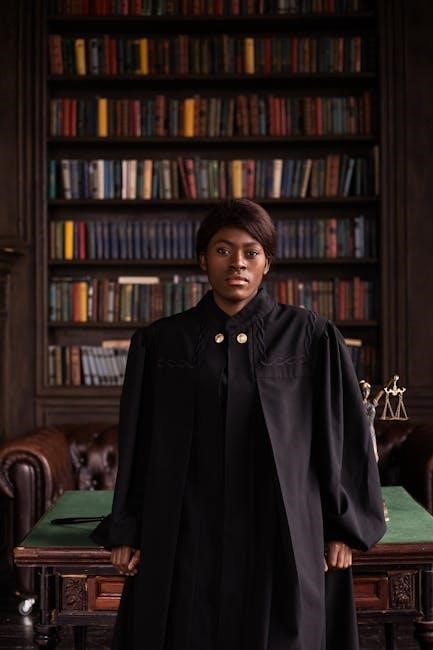Act Overview
In Act 3‚ Macbeth‚ now king‚ faces paranoia and hires murderers to kill Banquo and Fleance. Banquo suspects foul play in Duncan’s death‚ and only Fleance escapes‚ deepening Macbeth’s turmoil and consequences.
1.1. Summary of the Act
Act 3 of Macbeth focuses on the aftermath of Duncan’s murder and Macbeth’s rise to power. Now king‚ Macbeth becomes increasingly consumed by paranoia‚ fearing that Banquo’s descendants will overthrow him‚ as prophesied by the witches. To prevent this‚ Macbeth hires murderers to kill Banquo and his son Fleance. Banquo is slain‚ but Fleance escapes. Meanwhile‚ Lady Macbeth reveals her own guilt and anxiety about their crimes. The act culminates in a royal banquet where Macbeth is haunted by Banquo’s ghost‚ symbolizing his spiraling guilt and paranoia. This act highlights the destructive nature of ambition and the moral consequences of Macbeth’s actions‚ as his reign becomes marked by violence and fear.
1.2. Key Events in Act 3
Act 3 of Macbeth is marked by significant events that drive the plot forward. Macbeth‚ now king‚ hires two murderers to kill Banquo and his son Fleance‚ fearing the prophecy that Banquo’s descendants will rule Scotland. Banquo is murdered‚ but Fleance escapes. Meanwhile‚ Lady Macbeth expresses her own guilt and anxiety about their crimes. The act reaches its climax during a royal banquet‚ where Macbeth is haunted by Banquo’s ghost‚ symbolizing his overwhelming guilt and paranoia. These events highlight Macbeth’s descent into tyranny and madness‚ as his actions become increasingly violent and unpredictable. The escape of Fleance and the haunting ghost foreshadow the consequences of Macbeth’s actions‚ setting the stage for further tragedy and unrest in Scotland.
1.3. Significance of Act 3
Act 3 is pivotal in Macbeth as it accelerates the protagonist’s downfall and deepens the play’s exploration of ambition‚ guilt‚ and power. The murder of Banquo and the escape of Fleance intensify Macbeth’s paranoia‚ showcasing his ruthless determination to maintain the throne. The haunting by Banquo’s ghost during the banquet highlights Macbeth’s psychological unraveling‚ revealing the moral and emotional consequences of his actions. This act also underscores the themes of betrayal and loyalty‚ as Macbeth turns against his once-trusted friend. Furthermore‚ the failure to eliminate Fleance leaves Macbeth vulnerable‚ foreshadowing his eventual demise. Act 3 thus solidifies Macbeth’s transformation from a noble warrior to a tyrannical ruler‚ emphasizing the destructive nature of unchecked ambition and the inevitability of justice‚ which drives the play’s tragic conclusion.

Themes
Themes in Act 3 include ambition driving destruction‚ guilt haunting actions‚ and loyalty clashing with betrayal‚ creating tension and highlighting the moral decay of Macbeth’s rule.

2.1. Ambition
Ambition in Act 3 fuels Macbeth’s descent into tyranny. His desire to secure the throne leads him to orchestrate Banquo’s murder‚ fearing Fleance might fulfill the witches’ prophecy. Macbeth’s ambition transforms from a motivational force into a destructive obsession‚ causing him to act ruthlessly. This relentless pursuit of power isolates him morally and emotionally‚ highlighting the corrupting influence of unchecked ambition. Banquo’s suspicions and growing influence further ignite Macbeth’s fears‚ pushing him to extreme measures. The consequences of Macbeth’s actions reveal the tragedy of ambition without conscience‚ as his reign becomes marked by violence and paranoia rather than the greatness he initially sought.
2.2. Guilt and Paranoia
In Act 3‚ guilt and paranoia dominate Macbeth’s psyche. Haunted by Banquo’s ghost during the banquet‚ Macbeth’s paranoia intensifies‚ revealing his deep-seated guilt over the murder. His erratic behavior alarms his guests‚ showcasing the psychological toll of his crimes. Lady Macbeth‚ though initially dismissive of guilt‚ begins to express concern‚ hinting at her own internal turmoil. The murders Macbeth orchestrates only escalate his paranoia‚ as he becomes convinced that Fleance’s survival threatens his rule. This relentless cycle of guilt and fear drives Macbeth further into madness‚ isolating him from his allies and unraveling his moral fabric. The interplay of guilt and paranoia underscores the devastating consequences of Macbeth’s actions‚ transforming him into a tyrant consumed by his own mind.
2.3. Loyalty and Betrayal
In Act 3‚ loyalty and betrayal are central themes as relationships crumble. Macbeth betrays Banquo‚ once his loyal friend‚ by orchestrating his murder‚ driven by fear of the witches’ prophecy. Banquo‚ suspicious of Macbeth’s rise to power‚ contemplates the possibility of betrayal‚ heightening tension. The murderers‚ though loyal to Macbeth’s orders‚ hesitate‚ revealing moral conflict. Fleance’s escape undermines Macbeth’s plan‚ intensifying his paranoia. Lady Macbeth’s concern for Macbeth’s actions suggests a fracture in their alliance. The breakdown of loyalty and trust isolates Macbeth‚ as his subjects grow wary of his tyrannical behavior. This theme underscores the destructive nature of betrayal and the erosion of trust‚ reshaping the play’s moral landscape and driving characters toward their tragic fates. The interplay of loyalty and betrayal highlights the devastating consequences of ambition and deceit.

Motifs and Symbols
In Act 3‚ motifs of supernatural elements‚ light and darkness‚ and blood imagery dominate‚ symbolizing guilt‚ moral decay‚ and the haunting consequences of betrayal and sin.
3.1. Supernatural Elements
In Act 3‚ the witches’ prophecies continue to cast a shadow over Macbeth‚ fueling his paranoia and ambition. Banquo’s ghost haunts Macbeth at the banquet‚ symbolizing guilt and the supernatural consequences of his deeds. The ghost serves as a visible manifestation of Macbeth’s internal torment and the unescapable reality of his crimes. The witches’ predictions also linger‚ creating tension as Macbeth struggles to reconcile his actions with the prophecies. The supernatural elements heighten the dramatic tension‚ emphasizing the moral decay and the inescapable fate that Macbeth has created for himself. These motifs reinforce the play’s themes of guilt‚ paranoia‚ and the destructive power of ambition. The supernatural thus remains a central force driving the plot and character development in Act 3.
3.2. Light and Darkness
In Act 3‚ the motif of light and darkness underscores the moral and emotional turmoil of the characters. Light symbolizes truth and innocence‚ while darkness represents evil and deception. Macbeth’s reign is marked by spiritual darkness‚ as he descends further into tyranny and madness. The murderers operate under the cover of night‚ emphasizing the secretive and sinister nature of their deeds. Banquo’s ghost‚ a supernatural element‚ appears in the darkness of the banquet‚ haunting Macbeth and symbolizing his guilt. Lady Macbeth‚ once a symbol of ambition‚ now struggles with her own darkness‚ as her conscience begins to unravel. The interplay of light and darkness highlights the characters’ moral decay and the chaotic world they inhabit‚ reinforcing the tragic consequences of their choices. This motif remains central to the play’s exploration of morality and the human condition.
3.3. Blood Imagery
Blood imagery in Act 3 of Macbeth serves as a potent symbol of guilt‚ violence‚ and consequences. Macbeth’s hands‚ once metaphorically stained with Duncan’s blood‚ now confront the literal blood of Banquo. The murderers return with bloodied daggers‚ a grim reminder of their deed. Banquo’s blood symbolizes the irreversible nature of Macbeth’s actions‚ haunting him during the banquet. Lady Macbeth‚ though not directly involved in this murder‚ is psychologically tormented by the bloodstains of her past actions‚ reflecting her internal turmoil. The recurring motif of blood emphasizes the moral corruption and the inescapable burden of sin that both Macbeth and Lady Macbeth carry. This imagery reinforces the play’s themes of guilt‚ paranoia‚ and the destructive nature of unchecked ambition‚ leaving a lasting impact on the characters and the audience alike.

Character Development
Macbeth’s paranoia intensifies as he orders Banquo’s murder‚ revealing his ruthless ambition. Banquo’s suspicion of Macbeth grows‚ while Lady Macbeth shows increasing concern over their dark actions.
4.1. Macbeth’s Downfall
Macbeth’s descent into tyranny accelerates in Act 3. His decision to murder Banquo and Fleance stems from a growing paranoia‚ fueled by the witches’ prophecies. Despite securing the throne‚ Macbeth’s guilt and fear intensify‚ haunting him with Banquo’s ghost. This hallucination at the banquet symbolizes his fractured psyche and unchecked ambition. His once-noble character erodes‚ replaced by ruthless pragmatism‚ isolating him from former allies. The death of Banquo not only fails to secure his reign but also deepens his internal torment‚ marking the beginning of his inevitable downfall. Macbeth’s actions reveal a leader consumed by guilt‚ paranoia‚ and the consequences of his choices.
4.2. Banquo’s Suspicion
Banquo’s suspicion of Macbeth grows significantly in Act 3. He begins to question whether Macbeth’s rise to power aligns with the witches’ prophecies‚ particularly the prediction that Banquo’s descendants will become kings. Banquo paces in the royal palace‚ contemplating the witches’ words and his own growing unease about Macbeth’s actions. He openly expresses his mistrust of Macbeth‚ fearing that Macbeth may see him as a threat to his rule. Banquo’s suspicion is further heightened by Macbeth’s sudden and unexplained behavior‚ leading him to wonder if Macbeth orchestrated Duncan’s murder. This tension between Banquo and Macbeth creates a sense of impending conflict‚ as Banquo’s awareness of the prophecies and his own ambition make him a potential obstacle to Macbeth’s reign.
4.3. Lady Macbeth’s Role
Lady Macbeth’s role in Act 3 shifts as her confidence and influence over Macbeth wane. Initially‚ she appears concerned about Macbeth’s growing paranoia and isolation‚ urging him to maintain composure. However‚ her own guilt begins to surface‚ particularly in her sleepwalking scene‚ where she subconsciously reveals her complicity in Duncan’s murder. Her famous “unsex me” speech from earlier acts contrasts with her vulnerability in Act 3‚ as she struggles to cope with the consequences of their actions. Lady Macbeth’s role evolves from a driving force behind Macbeth’s ambition to a figure haunted by her own conscience. Her interactions with Macbeth become strained‚ and her once-bold demeanor gives way to a deepening internal turmoil‚ highlighting the psychological toll of their crimes.

Scene Analysis
Act 3 explores pivotal scenes: Banquo’s murder‚ Lady Macbeth’s growing concern‚ the murderers’ deception‚ and the haunting banquet with Banquo’s ghost‚ intensifying Macbeth’s guilt and paranoia.
These moments highlight the consequences of ambition and betrayal.
5.1. Scene 1: Murder of Banquo
In Act 3‚ Scene 1‚ Macbeth hires two murderers to kill Banquo and his son Fleance‚ driven by paranoia over the witches’ prophecy that Banquo’s descendants will rule Scotland. Banquo’s suspicion of Macbeth grows as he contemplates the witches’ predictions‚ fearing Macbeth’s rising power. The scene unfolds with Macbeth orchestrating the murder‚ revealing his deep-seated insecurity and ambition. The murderers ambush Banquo‚ killing him‚ but Fleance escapes‚ leaving Macbeth’s plan incomplete. This event escalates Macbeth’s guilt and paranoia‚ as Banquo’s ghost later haunts him‚ symbolizing his conscience. The murder marks a turning point‚ showcasing Macbeth’s descent into tyranny and the irreversible consequences of his actions. This scene highlights the destructive nature of ambition and the unraveling of Macbeth’s mental state.
5.2. Scene 2: Lady Macbeth’s Concern
In Act 3‚ Scene 2‚ Lady Macbeth expresses her growing concern about Macbeth’s mental state and the consequences of their actions. She attempts to comfort Macbeth‚ who is haunted by Banquo’s ghost‚ but her efforts fail to alleviate his guilt and paranoia. Lady Macbeth’s own anxiety intensifies as she realizes the gravity of their crimes and the instability of their rule. Her concern reflects the deteriorating relationship between the couple and the moral decay that has consumed them. This scene highlights Lady Macbeth’s diminishing control over Macbeth and her own inner turmoil‚ as she struggles to maintain a facade of normalcy amidst the chaos. Her role shifts from a driving force of ambition to a witness of its destructive consequences‚ adding depth to the tragedy unfolding around them.
5.3. Scene 3: The Murderers’ Deception
In Act 3‚ Scene 3‚ the two murderers ambush Banquo and Fleance near the palace. Banquo is killed‚ but Fleance escapes‚ which frustrates the murderers’ mission; They report back to Macbeth‚ who is relieved to hear of Banquo’s death but dismayed by Fleance’s escape. Macbeth’s paranoia intensifies as he fears that Fleance might one day threaten his rule. The scene highlights the murderers’ ruthlessness and Macbeth’s growing instability. It also underscores the theme of deception‚ as the murderers manipulate the situation to their advantage while Macbeth struggles with the consequences of his actions. This moment marks a turning point in Macbeth’s descent into tyranny and guilt‚ as he becomes increasingly consumed by his own dark ambitions and the fear of losing power. The escape of Fleance leaves Macbeth in a state of heightened anxiety and foreboding.
5.4. Scene 4: Banquet and Ghost
In Act 3‚ Scene 4‚ Macbeth hosts a banquet to celebrate his kingship‚ but the evening turns eerie when Banquo’s ghost appears‚ visible only to Macbeth. The king’s guilt and paranoia surface as he reacts hysterically to the ghost‚ shocking his guests. Lady Macbeth tries to dismiss his behavior as a momentary lapse‚ but the atmosphere grows tense. The ghost’s presence symbolizes Macbeth’s internal torment and the haunting consequences of his crimes. This scene showcases Macbeth’s psychological unraveling and the strain on his relationships‚ as even public events are overshadowed by his guilt. The ghost’s appearance reinforces the theme of guilt and paranoia‚ highlighting how Macbeth’s conscience cannot escape the repercussions of his actions. The banquet becomes a turning point‚ revealing the cracks in Macbeth’s facade of power and control.

Study Aids

SparkNotes and Quizlet offer detailed summaries‚ analysis‚ and essay topics for Act 3‚ aiding students in understanding themes‚ characters‚ and key scenes like Banquo’s murder and Macbeth’s guilt.
6.1. Study Questions
How does Macbeth’s decision to kill Banquo reflect his growing paranoia?
What role do the murderers play in Act 3?
How does Banquo’s suspicion of Macbeth affect the plot?
What significance does Banquo’s ghost hold in the story?
How does Lady Macbeth’s concern for Macbeth reveal her character?
What themes emerge from the banquet scene with Banquo’s ghost?
How does Macbeth’s guilt manifest after Banquo’s murder?
What does Fleance’s escape signify for Macbeth’s rule?
How does Macbeth’s relationship with Banquo change after Act 3?
What impact does Act 3 have on the overall tragic progression of the play?
6.2. Essay Topics
Analyze how Macbeth’s ambition drives his actions in Act 3 and explore its consequences.
Discuss the role of guilt and paranoia in Macbeth’s downfall throughout the act.
Examine the significance of Banquo’s ghost and its impact on Macbeth’s psyche.
How does Lady Macbeth’s role evolve in Act 3‚ and what does this reveal about her character?
Explore the theme of betrayal in Act 3‚ focusing on Macbeth’s betrayal of Banquo.
Discuss the use of supernatural elements in Act 3 and their dramatic significance.
How does Shakespeare use the banquet scene to highlight Macbeth’s internal conflict?
Analyze the motif of blood imagery in Act 3 and its symbolic meaning.
Examine the dynamics of power and loyalty in the relationship between Macbeth and Banquo.
Discuss how Act 3 contributes to the overall tragic progression of the play.
6.3. Further Reading
For a deeper understanding of Act 3‚ explore SparkNotes and other literary guides that provide detailed summaries‚ themes‚ and character analyses. Read critical essays on Macbeth’s descent into tyranny‚ Banquo’s suspicions‚ and Lady Macbeth’s unraveling. Examine historical contexts and Shakespeare’s use of language in creating tension. Discover modern interpretations and adaptations of Act 3 to gain fresh perspectives. Review scholarly articles on motifs like guilt‚ ambition‚ and betrayal. Engage with discussion forums and analysis videos to explore complex scenes‚ such as the banquet and Banquo’s murder. Additionally‚ study the historical background of 11th-century Scotland to enrich your understanding of the play’s setting. These resources will enhance your comprehension and appreciation of Act 3’s dramatic significance and its role in the overall tragedy.
